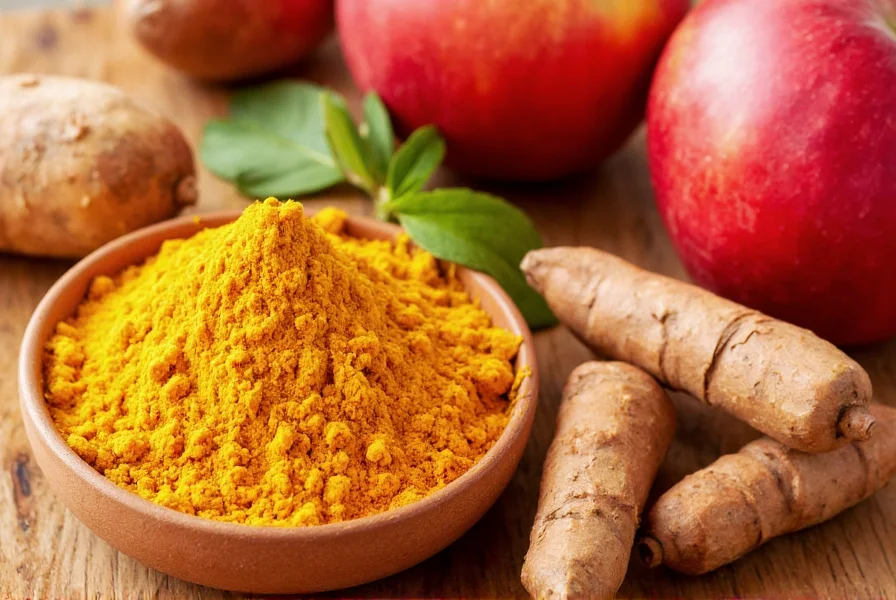When exploring natural wellness approaches, many people wonder about combining turmeric and apple cider vinegar. This article examines what current research reveals about these popular ingredients, separating evidence-based findings from anecdotal claims. Understanding the scientific evidence for turmeric and apple cider vinegar helps consumers make informed decisions about incorporating them into their wellness routines.
The Science Behind Turmeric
Turmeric, a vibrant yellow spice used for centuries in Ayurvedic medicine, contains curcumin as its primary active compound. Modern research indicates curcumin possesses potent anti-inflammatory and antioxidant properties. According to a 2022 review published in Nutrients, curcumin supplementation demonstrated significant reductions in inflammatory markers across multiple clinical trials. However, curcumin has low bioavailability on its own, which is why many health benefits of turmeric and apple cider vinegar discussions mention combining it with black pepper (containing piperine) to enhance absorption.
Common applications of turmeric include supporting joint health, reducing exercise-induced inflammation, and potentially aiding digestive function. The Arthritis Foundation acknowledges turmeric's potential benefits for osteoarthritis symptoms, though they emphasize it shouldn't replace prescribed treatments.
Understanding Apple Cider Vinegar
Apple cider vinegar (ACV), produced through double fermentation of apple juice, contains acetic acid as its primary active component. Research suggests ACV may help moderate post-meal blood sugar spikes. A 2021 meta-analysis in Diabetes Research and Clinical Practice found that vinegar consumption significantly reduced postprandial glucose levels in individuals with insulin resistance.
Traditional uses of ACV include supporting digestion and promoting feelings of fullness. Some preliminary research indicates potential benefits for weight management when used as part of a balanced diet, though evidence remains limited. The potential side effects of turmeric and ACV combination should be considered, particularly regarding dental enamel erosion from frequent ACV consumption.
Evaluating the Combination
Despite popular wellness trends promoting turmeric and ACV for inflammation as a powerful duo, scientific literature contains minimal research specifically examining their combined effects. Most evidence supporting this combination comes from anecdotal reports rather than clinical studies.
| Ingredient | Primary Active Compound | Research-Supported Benefits | Typical Culinary Dosage |
|---|---|---|---|
| Turmeric | Curcumin | Anti-inflammatory effects, antioxidant properties | 1-3 grams dried root powder daily |
| Apple Cider Vinegar | Acetic Acid | Blood sugar regulation, potential digestive support | 1-2 tablespoons diluted daily |
When considering how to use turmeric with apple cider vinegar, most wellness practitioners recommend diluting ACV in water (1-2 tablespoons in 8 ounces) and adding a 1/4 to 1/2 teaspoon of turmeric. Some include black pepper to enhance curcumin absorption. However, no standardized protocol exists due to the lack of clinical research on this specific combination.
Safety Considerations
While both ingredients are generally recognized as safe in culinary amounts, certain precautions apply. Turmeric may interact with blood-thinning medications, and excessive consumption could cause gastrointestinal discomfort. Apple cider vinegar's acidity requires proper dilution to prevent tooth enamel erosion and throat irritation.
Individuals with kidney disorders should consult healthcare providers before regular consumption, as both ingredients affect electrolyte balance. Those taking diabetes medications should monitor blood sugar closely when using ACV, as it may enhance medication effects. Understanding these factors is crucial when exploring turmeric and apple cider vinegar dosage guidelines.
Practical Usage Guidelines
For those interested in incorporating both ingredients into their routine, here are evidence-informed suggestions:
- Dilute 1-2 tablespoons of apple cider vinegar in 8 ounces of water before consumption
- Add 1/4 to 1/2 teaspoon of turmeric to the mixture, along with a pinch of black pepper
- Consume once daily, preferably before a meal
- Use a straw to minimize contact with teeth when drinking ACV mixtures
- Monitor your body's response and discontinue if adverse effects occur

Remember that does turmeric and apple cider vinegar work together remains partially unanswered by current research. While both have individual benefits supported by varying degrees of evidence, their combined effects haven't been rigorously studied. The most reliable approach treats them as complementary to, not replacements for, conventional medical care and healthy lifestyle practices.
Current Research Limitations
Most studies examining turmeric's effects use standardized curcumin extracts rather than culinary turmeric, while ACV research typically investigates vinegar generally rather than specifically apple cider varieties. This creates a gap when evaluating natural remedies with turmeric and ACV as commonly prepared at home.
A 2023 review in Complementary Therapies in Medicine noted the need for more targeted research on common natural remedy combinations. The authors emphasized that while individual ingredient research shows promise, combination effects may differ due to potential interactions between compounds.

Conclusion
The combination of turmeric and apple cider vinegar represents a popular wellness trend with some theoretical basis but limited direct scientific validation. Both ingredients offer potential health benefits when used appropriately, but consumers should maintain realistic expectations about their effects. Rather than viewing this pairing as a miracle solution, consider it as one component of a comprehensive approach to wellness that includes balanced nutrition, regular exercise, and appropriate medical care.
When exploring scientific evidence for turmeric and apple cider vinegar, prioritize quality sources and recognize that many health claims circulating online lack rigorous scientific backing. As research continues to evolve, we may gain clearer insights into how these traditional ingredients can best support health when used individually or together.
Frequently Asked Questions
Can turmeric and apple cider vinegar help with weight loss?
Current evidence doesn't support significant weight loss from combining these ingredients. While ACV may promote modest feelings of fullness and turmeric has anti-inflammatory properties, neither is a weight loss solution. Sustainable weight management requires comprehensive dietary and lifestyle changes under professional guidance.
How long does it take to see benefits from turmeric and ACV?
Individual responses vary significantly. Some people report noticing digestive improvements within days, while anti-inflammatory effects might take several weeks of consistent use. However, many perceived benefits could be placebo effects since robust clinical evidence for the combination is limited. Always consult healthcare providers about expected timelines for specific health concerns.
Are there any medication interactions to consider?
Yes, both ingredients can interact with medications. Turmeric may enhance blood-thinning medications like warfarin, while ACV can affect diabetes medications and diuretics. Always consult your healthcare provider before adding these to your routine if you take prescription medications, as potential side effects of turmeric and ACV combinations with medications can be serious.
What's the best time to consume turmeric with apple cider vinegar?
Most practitioners recommend consuming diluted ACV with turmeric 15-30 minutes before a meal to potentially support digestion. However, those with sensitive stomachs might tolerate it better with food. There's no research confirming an optimal timing for the turmeric and apple cider vinegar dosage, so individual experimentation under professional guidance may be necessary.











 浙公网安备
33010002000092号
浙公网安备
33010002000092号 浙B2-20120091-4
浙B2-20120091-4